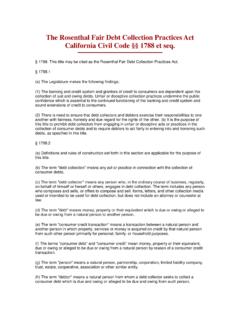Transcription of The Rosenthal Fair Debt Collection Practices Act
1 The Rosenthal Fair Debt Collection Practices Act California Civil Code 1788 et seq. 1788. This title may be cited as the Rosenthal Fair Debt Collection Practices Act. (a) The Legislature makes the following findings: (1) The banking and credit system and grantors of credit to consumers are dependent upon the Collection of just and owing debts. Unfair or deceptive Collection Practices undermine the public confidence which is essential to the continued functioning of the banking and credit system and sound extensions of credit to consumers. (2) There is need to ensure that debt collectors and debtors exercise their responsibilities to one another with fairness, honesty and due regard for the rights of the other.
2 (b) It is the purpose of this title to prohibit debt collectors from engaging in unfair or deceptive acts or Practices in the Collection of consumer debts and to require debtors to act fairly in entering into and honoring such debts, as specified in this title. (a) Definitions and rules of construction set forth in this section are applicable for the purpose of this title. (b) The term "debt Collection " means any act or practice in connection with the Collection of consumer debts. (c) The term "debt collector" means any person who, in the ordinary course of business, regularly, on behalf of himself or herself or others, engages in debt Collection .
3 The term includes any person who composes and sells, or offers to compose and sell, forms, letters, and other Collection media used or intended to be used for debt Collection , but does not include an attorney or counselor at law. (d) The term "debt" means money, property or their equivalent which is due or owing or alleged to be due or owing from a natural person to another person. (e) The term "consumer credit transaction" means a transaction between a natural person and another person in which property, services or money is acquired on credit by that natural person from such other person primarily for personal, family, or household purposes.
4 (f) The terms "consumer debt" and "consumer credit" mean money, property or their equivalent, due or owing or alleged to be due or owing from a natural person by reason of a consumer credit transaction. (g) The term "person" means a natural person, partnership, corporation, limited liability company, trust, estate, cooperative, association or other similar entity. (h) The term "debtor" means a natural person from whom a debt collector seeks to collect a consumer debt which is due and owing or alleged to be due and owing from such person. (i) The term "creditor" means a person who extends consumer credit to a debtor.
5 (j) The term "consumer credit report" means any written, oral or other communication of any information by a consumer reporting agency bearing on a consumer's creditworthiness, credit standing, credit capacity, character, general reputation, personal characteristics or mode of living which is used or expected to be used or collected in whole or in part for the purpose of serving as a factor in establishing the consumer's eligibility for (1) credit or insurance to be used primarily for person, family, or household purposes, or (2) employment purposes, or (3) other purposes authorized under any applicable federal or state law or regulation.
6 The term does not include (a) any report containing information solely as to transactions or experiences between the consumer and the person making the report; (b) any authorization or approval of a specific extension of credit directly or indirectly by the issuer of a credit card or similar device; or (c) any report in which a person who has been requested by a third party to make a specific extension of credit directly or indirectly to a consumer conveys his or her decision with respect to that request, if the third party advises the consumer of the name and address of the person to whom the request was made and such person makes the disclosures to the consumer required under any applicable federal or state law or regulation.
7 (k) The term "consumer reporting agency " means any person which, for monetary fees, dues, or on a cooperative nonprofit basis, regularly engages, in whole or in part, in the practice of assembling or evaluating consumer credit information or other information on consumers for the purpose of furnishing consumer credit reports to third parties, and which uses any means or facility for the purpose of preparing or furnishing consumer credit reports. Nothing contained in this title shall be construed to prohibit a credit union chartered under Division 5 (commencing with Section 14000) of the Financial Code or under the Federal Credit Union Act (Chapter 14 (commencing with Section 1751) of Title 12 of the United States Code) from providing information to an employer when the employer is ordinarily and necessarily entitled to receive such information because he is an employee, officer, committee member, or agent of such credit union.
8 No debt collector shall collect or attempt to collect a consumer debt by means of the following conduct: (a) The use, or threat of use, of physical force or violence or any criminal means to cause harm to the person, or the reputation, or the property of any person; (b) The threat that the failure to pay a consumer debt will result in an accusation that the debtor has committed a crime where such accusation, if made, would be false; (c) The communication of, or threat to communicate to any person the fact that a debtor has engaged in conduct, other than the failure to pay a consumer debt, which the debt collector knows or has reason to believe will defame the debtor; (d) The threat to the debtor to sell or assign to another person the obligation of the debtor to pay a consumer debt, with an accompanying false representation that the result of such sale or assignment would be that the debtor would lose any defense to the consumer debt.
9 (e) The threat to any person that nonpayment of the consumer debt may result in the arrest of the debtor or the seizure, garnishment, attachment or sale of any property or the garnishment or attachment of wages of the debtor, unless such action is in fact contemplated by the debt collector and permitted by the law; or (f) The threat to take any action against the debtor which is prohibited by this title. No debt collector shall collect or attempt to collect a consumer debt by means of the following Practices : (a) Using obscene or profane language; (b) Placing telephone calls without disclosure of the caller's identity, provided that an employee of a licensed Collection agency may identify himself by using his registered alias name as long as he correctly identifies the agency he represents.
10 (c) Causing expense to any person for long distance telephone calls, telegram fees or charges for other similar communications, by misrepresenting to such person the purpose of such telephone call, telegram or similar communication; (d) Causing a telephone to ring repeatedly or continuously to annoy the person called; or (e) Communicating, by telephone or in person, with the debtor with such frequency as to be unreasonable and to constitute an harassment to the debtor under the circumstances. No debt collector shall collect or attempt to collect a consumer debt by means of the following Practices : (a) Communicating with the debtor's employer regarding the debtor' s consumer debt unless such a communication is necessary to the Collection of the debt, or unless the debtor or his attorney has consented in writing to such communication.




